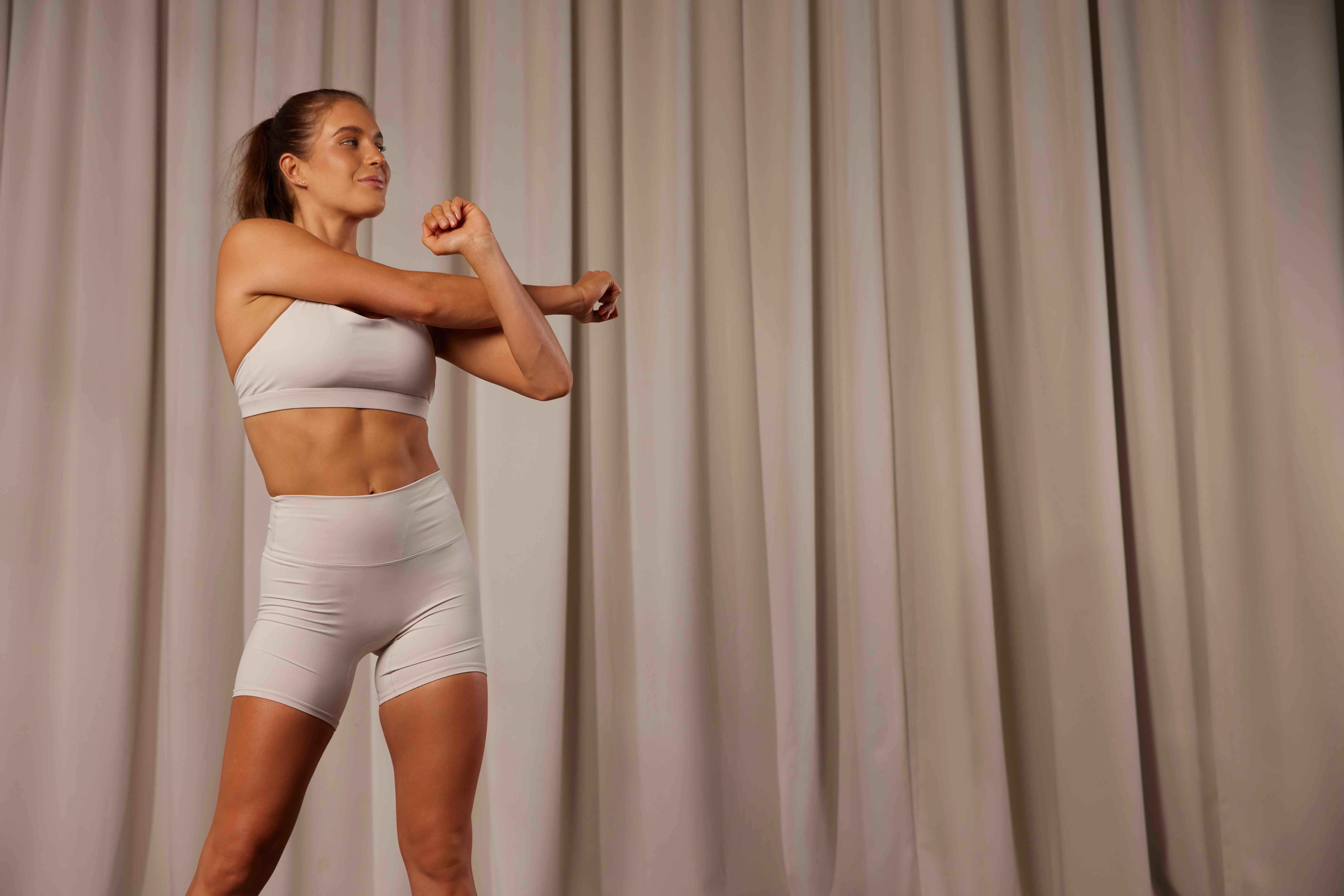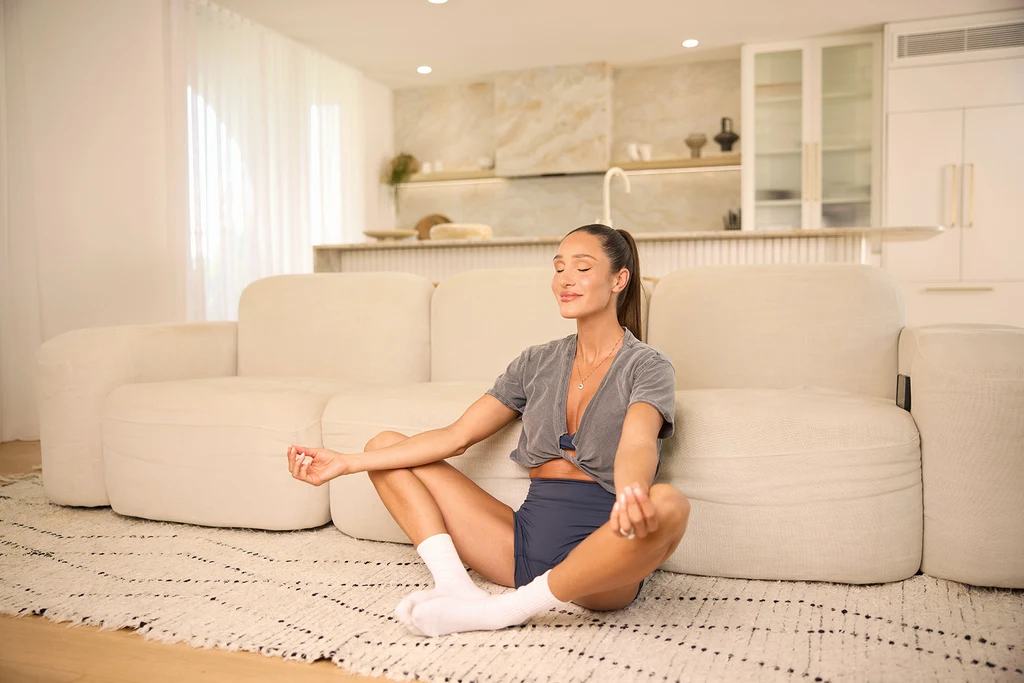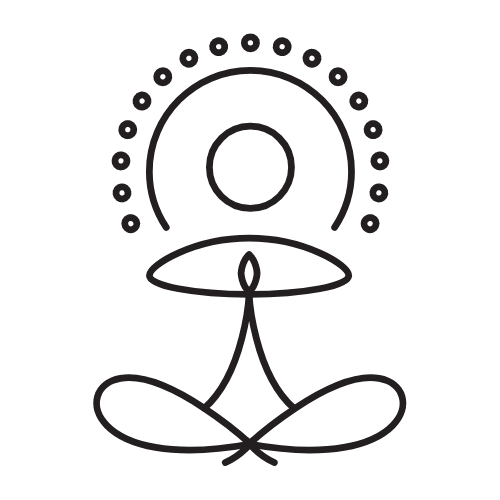When it comes to the benefits of exercise, the undeniable impact it has on your mental health is one you can’t look past. Working out regularly can be a powerful way to nourish your mind-body connection, a way to practice self-care and boost your self-esteem and confidence.
These epic benefits are something the YogaFokus Community are all too familiar with, with 89% of members telling us their mental wellbeing is an important reason why they work out and 93% highlighting the positive impact fitness has on their mental health.
If you’re thinking about sweating your way towards a happier, healthier you, here are some of the benefits you can expect.
Improve your sleep
Ready to move your way to a good night’s sleep? You’re in luck. Studies have found that regular exercise can improve sleep quality and be used to manage sleep disorders such as insomnia. However, not all exercise is equal when it comes to getting a better night’s sleep, with research finding moderate-intensity exercise to be particularly effective, while high-intensity sessions (especially if done close to bedtime) could in fact lead to difficulty sleeping.
John Hopkins Medicine highlights that the release of endorphins and increase in brain activity, paired with the rise in your core body temperature, can mean that morning workouts might be preferable if you’re looking at exercise to improve your sleep quality.
When it comes to what kind of movement will help you sleep your best, strength training is a great place to start. A 2018 review found that, compared with aerobic exercise, strength training was effective at improving all aspects of sleep, with sleep quality seeing the greatest uplift.
Boost your mood with feel-good endorphins
We all remember Elle Woods declaring that exercise gives you endorphins, and endorphins make you happy… but… what exactly are endorphins? Endorphins are a chemical your body releases to help reduce stress, relieve pain (Harvard Health describes it as the body’s natural painkiller), and boost pleasure or a sense of wellbeing. You can increase your body’s endorphin release by engaging in enjoyable activities such as working out, meditating, laughing, getting a massage, eating a good meal and having sex.
According to the Cleveland Clinic, this feel-good chemical response is particularly effective at improving your mental wellbeing, while also boosting the release of dopamine in your body which affects your mood.

Help alleviate the symptoms of anxiety and depression
Before we dive into the data here, it’s important to highlight that while exercise can be a powerful tool to have up your sleeve if you’re suffering from depression, anxiety or poor mental health, physical activity alone won’t be enough for everyone.
According to the World Health Organisation, one in every eight people live with a mental health condition with depression and anxiety being the most common. If you’re suffering from poor mental health we want you to know there are a range of effective prevention and treatment options out there, and recommend you reach out to your healthcare provider to establish an effective care plan for you.
Harvard Health has highlighted how, alongside a treatment plan established with a trusted medical professional, exercise can be a helpful tool in aiding in the treatment of mental health disorders, pointing to a 2023 study which found physical activity to be highly beneficial at improving the symptoms of depression, anxiety and distress across a wide range of adult populations.
Furthermore, researchers at the University of South Australia have called for exercise to be considered an approach for managing depression after a study found physical activity to be 1.5 times more effective than counselling or medication.
If regular exercise is already part of your routine but you still find your day to day life is impacted by anxiety, depression or poor mental health, the Mayo Clinic wants to remind you to seek out your healthcare professional to discuss other treatment options.
Manage stress better
Alongside its mood-boosting properties, fitness is regularly lauded for its ability to reduce stress. According to Harvard Health, physical activity can reduce the overall levels of stress hormones like cortisol (while also releasing those feel-good endorphins!).
Almost all forms of fitness are fantastic stress-relievers, with the Mayo Clinic highlighting that exercise can also support healthy functioning of all your systems during stressful times, such as lowering your blood pressure and improving your immune system.
Studies have promoted the idea that physical activity be used as a stress management tool in everyone from university students to older adults, with one study finding that regular exercise not only helps people deal with daily stressors but also has the added bonus of offering protection against diseases related to chronic stress.
One of our favourite ways to de-stress and prioritise the mind-body connection is through yoga, with a systematic review finding it reduces stress while also promoting overall wellbeing, with numerous biosignals that suggest stress reduction improving with the practice. Not sure where to get started? These are some of our go-to yoga poses to help you de-stress and promote relaxation.

Improve your confidence and self-esteem
When it comes to building confidence and improving your body image and self-esteem, exercise definitely gets our tick of approval.
Studies support the theory that increased physical activity promotes body image, with one study finding physical activity to be directly and indirectly linked with self-esteem and improved body image. This was further supported by a Gallup poll that found a direct link between feeling good about your appearance and regular workouts, with 70% of respondents who exercised for at least 30 minutes a day the week prior say they always feel good about their appearance.
Another piece of research looking specifically at women suggests aerobic exercise and aerobic exercise combined with strength training are the most impactful forms of fitness when it comes to improving how women feel about their bodies.
We know that female fitness transformations go far beyond an inspiring before and after image, with our trainers and members alike pointing to how they feel as the most powerful motivator.
“A picture doesn’t show the struggles, frustration, tears, or the celebrations when you finally achieve a goal,” shares Janelle. “It also doesn’t show you the other positive changes like feeling more confident, and it doesn’t show how far you’ve come or what you had to do to get to where you are.”
Help improve your brain function
When it comes to boosting your brain power, cognitive function and memory, regular exercise is a no-brainer. According to the Cleveland Clinic, an active body helps promote an active brain by supporting cell growth and increasing the movement of neurotransmitters, while a growing body of research has found exercise can even help counteract the impact of ageing – but the effect is significant at any age.
An umbrella review from the University of South Australia exploring findings from 133 systematic reviews, 2724 randomised controlled trials and 258,279 participants found low to moderate-intensity movement had the greatest benefits for brain function and memory, with children and adolescents seeing the greatest improvements in memory.
Research also suggests the impacts are even more profound for women than they are for men, with one study finding moderate weekly physical activity improved cognitive function by an average of 14% for women (versus 5% for men). The study – cited by the Royal Australian College of General Practitioners – has been pointed to as another example of how physical exercise can help mitigate cognitive decline in ageing adults.
For those with cognitive decline and an associated risk of dementia, one systematic review and meta-analysis found that exercise-driven improvements in cognitive function are likely driven by a combination of increased metabolic activity, cerebrovascular mechanisms and neuroplasticity throughout the brain, but cautioned that additional research and high-quality trials are needed to fully assess the relationship between physical activity and dementia.
Help reduce the impacts of loneliness and isolation
You know how much we love the YogaFokus Community, but did you know that there is growing evidence that suggests physical activity can help alleviate loneliness? From helping to foster a sense of connection and community, introducing you to a workout buddy (or two!) and enjoying the benefits of group exercise, we really are stronger together.
Looking to strengthen your social connections through movement? Why not…
-
Connect with the YogaFokus Community, a group of thousands of like-minded women just waiting to cheer you on.
-
Join a sports team or find somewhere you can connect and train with people in real life, such as a gym or run club
-
Find a workout buddy to train with IRL or one you can connect with digitally to keep each other motivated
-
Take your next workout outdoors to help get you out of the house.
YogaFokus for your body AND your mind
No matter what your motivation for movement looks like, we can help you find your perfect fit. The YogaFokus app features 60+ programs, thousands of workouts, hundreds of recipes and custom features designed to help you get the most out of your health and wellbeing journey.

